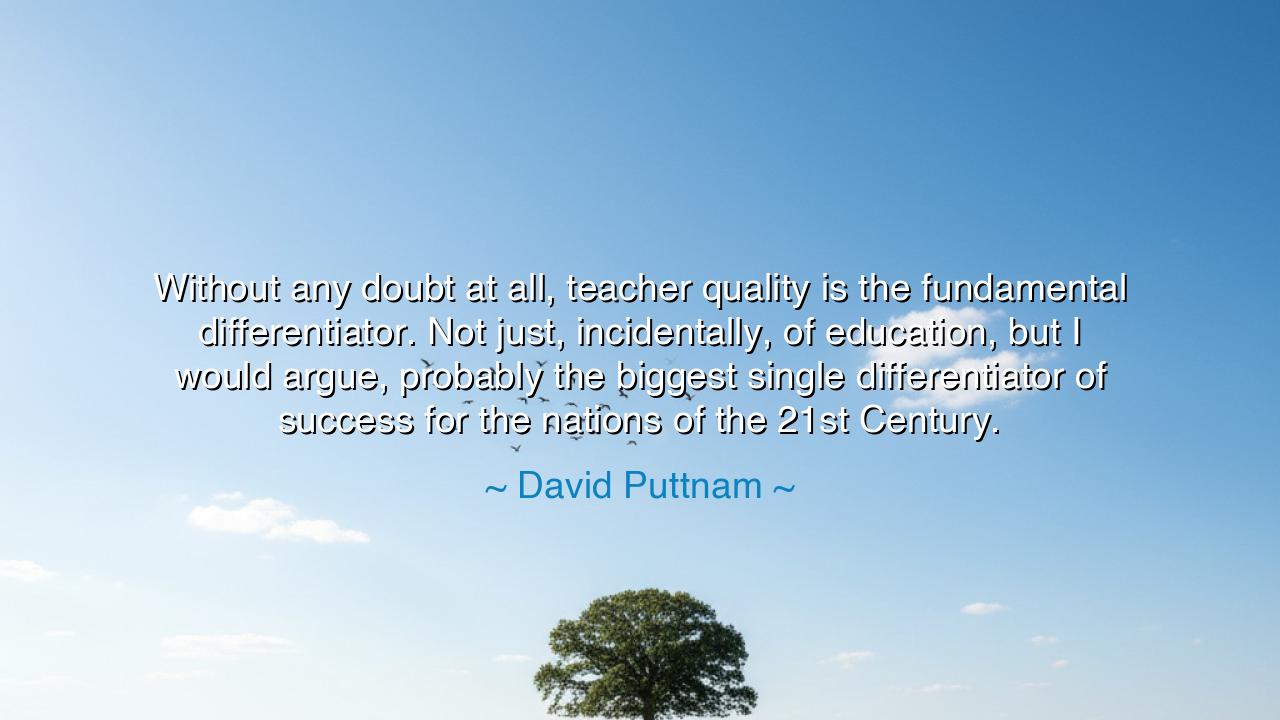
Without any doubt at all, teacher quality is the fundamental
Without any doubt at all, teacher quality is the fundamental differentiator. Not just, incidentally, of education, but I would argue, probably the biggest single differentiator of success for the nations of the 21st Century.






The words of David Puttnam—“Without any doubt at all, teacher quality is the fundamental differentiator. Not just, incidentally, of education, but I would argue, probably the biggest single differentiator of success for the nations of the 21st Century”—resound like a proclamation carved in stone. They are not the idle musings of chance, but the recognition of an eternal truth: that the destiny of a people is shaped not merely by wealth, armies, or even laws, but by the teachers who kindle the fire of knowledge in the young. For a teacher is the silent architect of the future, and the quality of their work determines the strength or fragility of a nation’s foundation.
The origin of this wisdom lies in the long history of civilizations. Wherever teachers have been honored and cultivated, nations have risen to greatness. Ancient Greece produced philosophers and leaders because it first nurtured the minds of its youth under the guidance of Socrates, Plato, and Aristotle. The flourishing of the Renaissance was not only the triumph of artists and explorers but also of scholars and teachers who passed on the wisdom of the ancients and dared to add to it. Puttnam, gazing upon the modern world of the 21st century, saw that this ancient pattern endures: the nations that will flourish are those that honor and empower their teachers.
Consider the story of Japan after the devastation of World War II. The nation lay in ruins, its cities bombed, its industries broken. Yet in rebuilding, Japan placed extraordinary emphasis on education. Teachers were elevated in status, trained with rigor, and given the task of shaping a disciplined, innovative generation. Within decades, Japan rose from ashes to become one of the most powerful economies in the world. This was not the work of generals alone, nor politicians alone, but of teachers who cultivated excellence in every classroom. Their quality became the true differentiator of national destiny.
The emotional power of Puttnam’s words lies in their challenge to our modern illusions. We are tempted to believe that technology, wealth, or natural resources are the engines of prosperity. Yet these are tools, not masters. A machine is useless in unskilled hands; resources are wasted without wisdom. It is teachers who transform raw potential into living strength. A child, properly guided, becomes an innovator, a healer, a leader. A child neglected, deprived of quality teaching, may become a burden or even a danger to society. Thus, the future of a nation lies not in its treasuries but in its classrooms.
There is something deeply heroic in this vision. For the teacher is often overlooked, underpaid, and undervalued, yet the fate of nations rests upon their shoulders. They do not march in parades, nor are their victories sung in triumphal hymns, but their influence echoes across centuries. The words they speak in humble classrooms may shape the ideas that one day steer governments, cure diseases, or craft works of immortal beauty. To neglect teachers is to neglect the very seed of greatness; to uplift them is to guarantee a harvest of glory.
The lesson for us is plain: if we would build a just, prosperous, and enduring society, we must place the highest priority on cultivating, supporting, and honoring quality teachers. This means not only fair wages and training, but reverence for their role, trust in their wisdom, and recognition that their labor is the most important labor of all. It also means, in our daily lives, that we must become teachers in small ways—mentors to the young, guides to the lost, inspirers of curiosity in all we meet.
What, then, shall we do? Let us, as individuals, honor our teachers with gratitude, recalling the ones who shaped us and striving to live lives that prove their efforts were not in vain. Let us, as communities, ensure that schools are not starved of resources, and that educators are not left to struggle in silence. Let us, as nations, measure our greatness not by armies or markets, but by the quality of teaching within our borders. For Puttnam’s words are no mere suggestion but a prophecy: the nations that exalt their teachers shall rise, and those that neglect them shall wither.
Thus, his words endure as a command to future generations: teacher quality is the fundamental differentiator. It is the fire at the heart of civilization, the thread that binds past to future. If we cherish it, we may yet guide the 21st century into an age of wisdom. If we ignore it, we risk falling back into the shadows of ignorance. The choice is ours, and it begins with how we honor the teachers among us.






AAdministratorAdministrator
Welcome, honored guests. Please leave a comment, we will respond soon